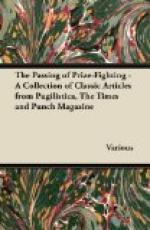Admiral Napier observed that “retired lawyers got better paid than retired admirals.” A gross injustice, as their vocations bear an extraordinary similarity; par example—both are attaches of the Fleet: in an action, both know the necessity of being bailed out to prevent swamping. One service is distinguished by its “davits,” the other by its “affidavits;” and they are mutually and equally admired for, and known by, their craft. The only difference between them being, that the lawyer serves “two masters”—the admiral, invariably, three masters. If the same remark applies to the members of the army-list, as well as to those of the navy and law, we must say that it is an extremely shabby method of
[Illustration: “RELIEVING GUARD.”]
* * * * *
LIST OF OUTRAGES.
The following list of outrages, recently perpetrated in the vicinity of a notoriously bad house near Westminster Abbey, has not appeared in any of the daily papers:—
LORD MELBOURNE—frightfully beaten, and turned out of his house by a gang of Peelites.
LORD JOHN RUSSELL—struck on the head by a large majority, and flung into a quandary.
LORD COTTENHAM—tripped up by a well-known member of the swell mob, and robbed of his seals.
MR. ROEBUCK—stripped and treated with barbarous inhumanity by a notorious bruiser named the Times. The unfortunate gentleman lies to the present moment speechless from the injuries he has sustained.
LORD NORMANBY—stabbed with some sharp instrument, supposed to be Lord Stanley’s tongue.
LORD MORPETH—struck in the dark by an original idea, from the effects of which he has not yet recovered.
* * * * *
ROOT AND BRANCH.
Roebuck, in complaining of the stigmas cast by the Times upon his pedigree, and vehemently insisting on the character of his family tree, was kindly assisted by Tom Duncombe, who declared the genus indisputable, as nobody could look in Roebuck’s face without perceiving his family tree must have been the “plane-tree.”
* * * * *
SONGS FOR THE SENTIMENTAL.—NO. 8.
You say I have forgot the vow
I breath’d in days long
past;
But had I faithful been, that thou
Hadst loved me to the last.
Without me, e’en a throne
thou’dst scorn—
With me, contented
beg!
False maid! ’tis not that I’m
forsworn,—
The boot’s on t’other
leg.
Amidst the revel thou wast gay,
The blithest with the song!
Though thou believ’dst me far away,
An exile at Boulogne.
’Twas then, and not till then, my
heart
To love thee did refuse;
My vows became (false that thou art!)—
Another pair of shoes!




